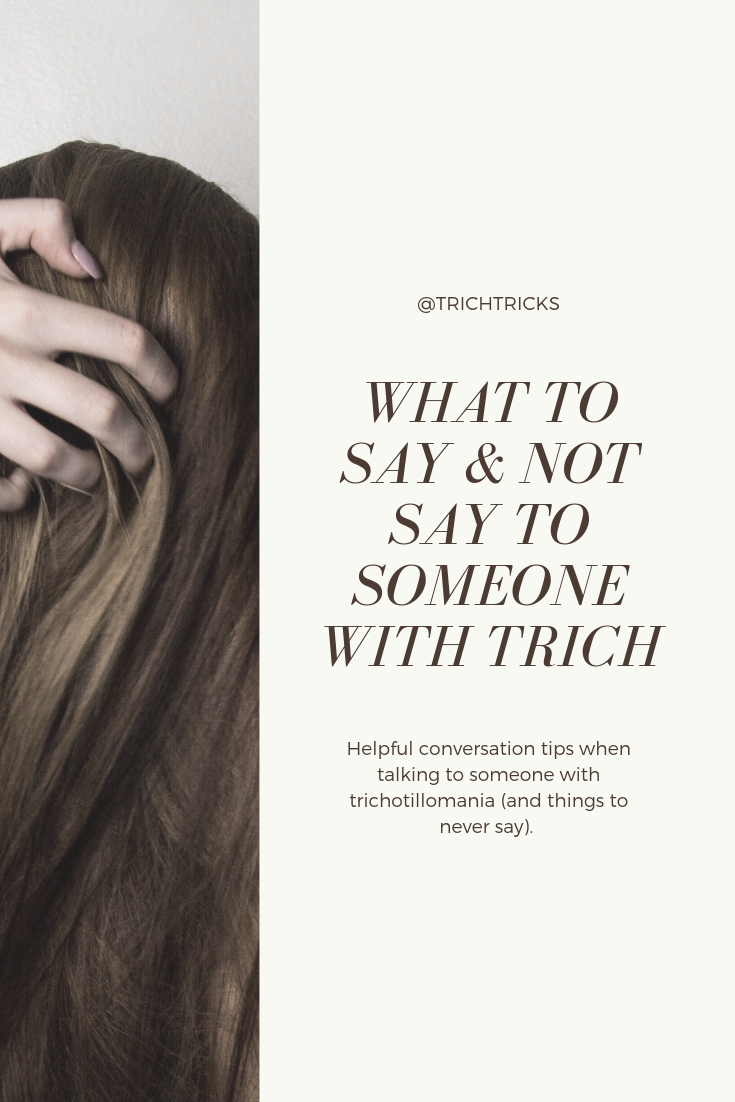How Trichotillomania Feels
Imagine waking up tomorrow and you were bald.
Seriously, let that sink in. Bald. No hair left on your head. Or no eyelashes. Or your eyebrows were gone. Imagine looking in the mirror at the person you no longer recognized.
Would you want to go to school? Go to that party? On that date? Leave the house? That’d probably be a hard pass.
Well, if you know someone with trich, this can be their daily life.
Some hair pullers go into a trance-like state, only to snap out of it after the damage has been done. Hair is found scattered all over the bed or floor and all that’s left behind is bald spots or no hair at all. Shame and embarrassment engulfs them.
Many pull to relieve stress, and even though some hair pullers may be “aware” (conscious pullers) of their pulling, it becomes so obsessive that the brain tricks them into believing the action of pulling (or pulling exactly the right hair) is the only way to find relief. Some people fixate on finding one specific hair that may feel or look different and can lose HOURS of sleep over this fixation. But the relief it provides once it’s pulled lasts only a second.
This hair pulling compulsion is not something someone can easily stop. Stopping is near impossible.
So, with all of the feelings that go along with trichotillomania, feeling out of control tops the list for many. And for people with anxiety disorders, this can be an especially scary realization.
Besides feeling out of your control, your self-confidence is shattered. You feel freakish. Ugly. Undeserving. Afraid. Paranoid. Depressed. Anxious.
(continued below)
So, if you know someone with trich, keep reading to get a better sense of what’s going on inside for them.
I asked Instagram, “How does it feel to have trichotillomania?” and these were the responses:
“Draining…all that progress to just end up back at square one.”
“Humiliating at times because you are sure people notice and judge.”
“It feels like crap!”
“It feels like my whole life’s ruined.”
“Embarrassing and terrible.”
“I’m constantly wishing I had normal hair. I’m not able to wear my hair in certain ways like I’d like to.”
“Defeating.”
“Ugly. Paranoid. No confidence. Depressed.”
“It’s very defeating, dejecting and all-consuming. It makes me feel alone.”
“Imagine feeling guilty and embarrassed every day.”
“It’s the worst feeling. Ever.”
“Fearful. Because of unpredictable situations or questions about my hair loss.”
Sounds awful, right? It’s not just a “bad habit” or something “they should stop.” This goes far beyond that.
So please don’t dote out advice or techniques you may think would work to your friend with trich; they’ve probably tried it all. But instead, allow yourself to feel what that feels like and ask them to explain more. Ask, “How does it feel for you?” “How do you feel today?” Really listen. Ask questions. Tell them how hard that must be and that they’re incredibly strong.
Try asking them what it feels like before and after they pull their hair. “Have you found any strategies that help?” or “Is there anything I could do to help or would that make you feel uncomfortable?” Ask them if they know their triggers – whether it be places, situations, people, etc. From there, you can form an engaging conversation about how to lessen those anxieties.
Have sympathy for your friend when you notice their bald spots, and don’t point them out. Don’t pressure them into social situations, they know the ones that may reveal their disorder and create heightened anxiety (usually pool/beach parties, windy situations like boat rides, sleepovers or events where you’re getting your makeup professionally done (where someone will be looking closely at their eyes)). All of these situations can be extremely anxiety inducing and I’m sure I’m only touching the tip of the iceberg. When/if they decline an event, don’t pressure them to attend but instead offer to say in with them and be an ear to listen.
Remember. It’s not a decision. It’s a disorder.
It’s debilitating. And the cycle of anxiety it produces causes even more pulling, so it’s like they’re stuck in a cycle of never-ending behavioral and emotional turmoil. Can you imagine?
Tell her she is beautiful. Tell him he is worthy. Tell them they are not their hair. And the more they can talk about it with you, my guess is their behavior and shame will diminish and their self-confidence will soar. This disorder is often a hidden one, so if they have you as a confidant who doesn’t judge, they will begin to heal in immeasurable ways. Imagine giving someone that?! You can.
My hope is that this gives you some emotional insight into having trichotillomania and helps you become a more compassionate and understanding friend to the person you love.
Comment below - How does trich make YOU feel? Or if you’re supporting someone with trich, what do you wish you knew or understood about the disorder?







